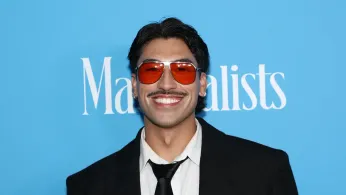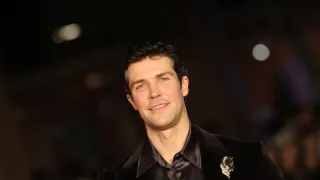
Aug 30
Eric Sedeño Launches ‘Wild Wild Web’ Podcast
READ TIME: 3 MIN.
On September 4, the digital landscape will welcome a fresh and affirming voice with the premiere of "Wild Wild Web", a new podcast hosted by Eric Sedeño, one of social media’s most visible queer content creators. At just 28, Sedeño has carved out a vibrant space for LGBTQ+ storytelling across platforms from TikTok to Instagram, and now brings his distinctive perspective to long-form audio with a series that promises to explore the intersections of queer identity, digital culture, and community in the Internet age .
Eric Sedeño—known to many online as @ricotaquito—has become a beacon for LGBTQ+ representation in the creator economy. With a dynamic presence on TikTok, Instagram, and other major platforms, he’s built an audience by blending humor, vulnerability, and advocacy. Sedeño’s previous podcast, Gay & Afraid, offered candid campfire-style chats with fellow creators, delving into viral moments, comedic inspiration, and the realities of living authentically online . His new venture draws on these roots, but with a broader focus on how queer identities navigate—and are shaped by—the “wild” world of digital media.
"Wild Wild Web" aims to be more than a podcast—it’s a conversation hub, a storytelling platform, and a safe space for LGBTQ+ listeners. Sedeño teases a format that combines insightful interviews, personal reflections, and explorations of viral phenomena across TikTok, Twitter, Instagram, Snapchat, Vine, Pinterest, Facebook, and more . Each episode will spotlight the ways digital platforms both empower and challenge queer people, from meme culture and online activism to harassment and censorship.
In his announcement, Sedeño describes the show as “a wild ride through the internet’s queerest corners,” promising “honest, hilarious, and sometimes heartbreaking” stories from guests who have found visibility, connection, and sometimes adversity online .
For LGBTQ+ audiences, digital media has long been a double-edged sword: a place for finding chosen family, building movements, and celebrating pride, but also a site of anonymity-fueled harassment and algorithmic bias. Sedeño’s podcast arrives at a pivotal moment, as queer creators grapple with shifting platform policies and rising misinformation. *Wild Wild Web* promises to foreground these issues, giving voice to those who have navigated both the joys and pitfalls of life online.
Sedeño’s own journey resonates with many in the queer community. As a Mexican-American, openly gay creator, he’s faced both adulation and abuse on social media, and has used his platform to advocate for inclusivity, mental health, and intersectionality in digital spaces . His storytelling is deeply rooted in lived experience, offering an honest lens on the realities LGBTQ+ people face in the “wild” virtual world.
As Sedeño himself noted in promotional teasers, the podcast’s trailer borrows from “old western” tropes, positioning the digital world as a frontier—unpredictable, exhilarating, and sometimes lawless . It’s a metaphor many queer creators will recognize: staking out safe territory in a space that often resists easy categorization.
The first episodes of "Wild Wild Web" will feature conversations with fellow creators and activists, focusing on viral breakthroughs, the mechanics of queer visibility, and the emotional stakes of living publicly online. Sedeño is expected to tackle topics ranging from the politics of platform moderation to the rise of queer micro-celebrities and the evolving landscape of digital pride .
Listeners can anticipate a blend of humor and heart, with episodes designed to resonate across the LGBTQ+ spectrum—including transgender people, nonbinary folks, and those whose experiences of queerness are shaped by race, disability, or nationality. Sedeño’s inclusive approach aims to ensure that all queer identities see themselves reflected and affirmed in the stories shared.






